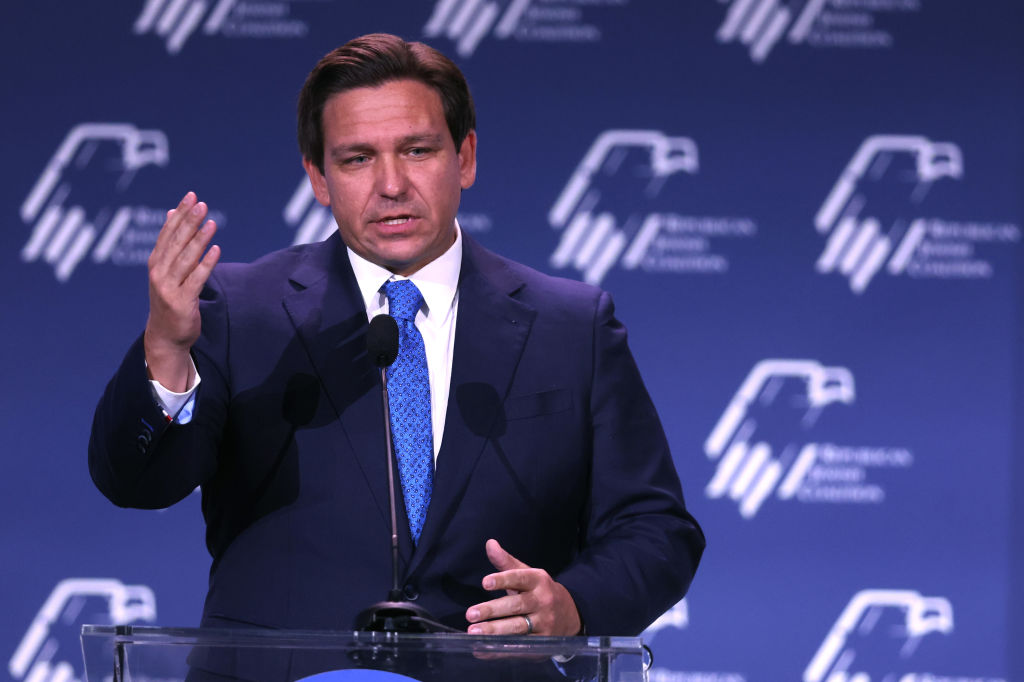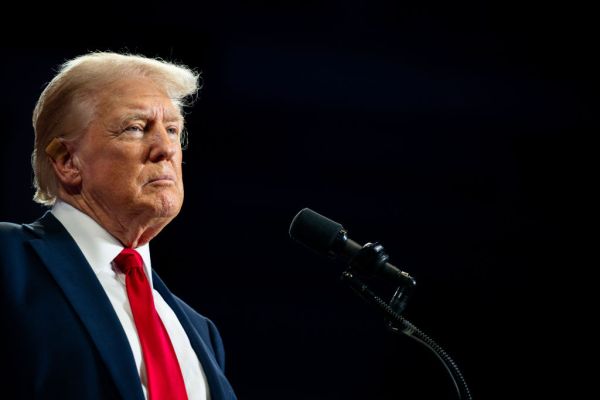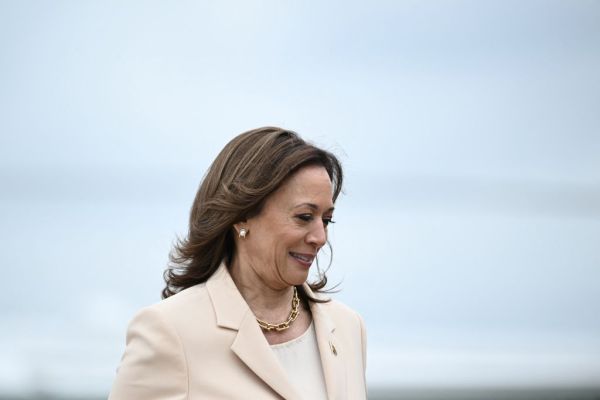On Wednesday Mike Pence was asked whether he’ll support his former running mate for president if that former running mate were to win the Republican nomination a third time. He dodged the question. When asked again, he gave this optimistic non-answer: “I’m very confident we’ll have better choices come 2024.”
That makes one of us, Mike.
Multiple polls published this week show Donald Trump gaining strength in the 2024 primary. The splashiest result, from Yahoo News and YouGov, found him leading Ron DeSantis 47-39; less than a month ago, DeSantis led by 4 points in the same poll. A separate poll from Echelon Insights saw Trump’s advantage balloon from 36-34 last month to 46-31 now. Another poll from Fox News matched that margin, placing Trump ahead of DeSantis 43-28.
The optimistic explanation for the shift is that Trump is enjoying a temporary bounce driven by his visit to East Palestine, Ohio. Republican voters savored the “America First” symbolism of their leader prioritizing suffering U.S. citizens while the leader of the other party prioritized suffering Ukrainians by visiting Kyiv. On this reading, the uptick in Trump’s polling isn’t evidence that he’s “gaining strength.” It’s an ephemeral burst of goodwill coupled with the fact that most primary voters haven’t had a good look at DeSantis yet. Once they get one, the gap will close.
The pessimistic explanation is that Trump’s early effort to define DeSantis as a shorter, huskier Paul Ryan has already worked better than anyone expected. His opponent may still be months away from entering the race but Trump is pulling no punches: Recently he described DeSantis as a “wheelchair over the cliff kind of guy” because of his interest in Medicare reform a decade ago, a reference to an infamous liberal attack ad in 2012. “Trump isn’t just embracing the welfare state,” said a disgusted Phil Klein, “he’s resorting to the same kind of distortions that the Democrats have been using against Republicans for decades.”
If the “RINO Ron” image is catching on among DeSantis-curious populists, the governor may find his ceiling of support lower than he hoped once he jumps in. Yet another new YouGov poll confirms that Republican voters are aware of some of DeSantis’ policy successes; he leads Trump when they’re asked which would do a better job on education, for instance. But on nine other topics tested, including DeSantis’ bread-and-butter issue of COVID, Trump holds the advantage. Pro-Trump sentiment among populists might be hardening before the challenger has had a chance to make his case. And it may harden further once the establishment Republicans whom they despise begin endorsing DeSantis in the interest of stopping you-know-who.
What’s ironic is that this is playing out alongside a squabble among anti-Trump commentators over whether President DeSantis might threaten America’s small-L liberal traditions more than President Trump would. To some critics of the right’s authoritarian drift, in other words, the Trump polling surge may qualify as good news, relatively speaking.
Not to me.
Where you stand in the debate over whether Trump or DeSantis as president would be worse for the country depends in part on how you came to it. Jonathan Chait fears that President DeSantis could be worse; he’s a liberal who’s written critically about the right for many years, long pre-dating the Trump era. Damon Linker believes that President Trump would be worse; he’s a centrist who grew more critical of the right as it came under Trump’s influence.
If, like Chait, you’re of the view that right-wing politics has always been pernicious, go figure that you might not assume Trump is the most pernicious possible avatar of it. He may be terrible but Republican leaders are always terrible; for all his faults, he didn’t try to end entitlements or to invade Iraq. And now that he’s remade the party in his populist image, cultivating an appetite among the base for illiberalism, he’s incentivized ambitious young Republican leaders to push the envelope. Already there are issues on which Ron DeSantis has staked out a less responsible position than Trump has.
If, like Linker or Charlie Sykes or me, you remember a time when spite wasn’t the animating impulse of right-wing politics—that cruelty wasn’t the point, to borrow a phrase—then you can’t be rid of Trump and his influence on the Republican Party soon enough. You might not care for Paul Ryan’s views on entitlement reform, but Ryan didn’t set about trying to destroy public trust in every civic institution that got in his way. He didn’t admire the “strength” of the worst human-rights violators on Earth or suggest that the Kremlin might be more trustworthy than the CIA. He didn’t resort to grandiose conspiracy theories to explain his setbacks or to barely veiled threats to intimidate his adversaries. He didn’t attempt any coups.
Regular readers know where I stand in this debate, but I show my cards here again in the interest of clarity. In the coming primary, my vote is for Anyone But Trump. And until some other Republican shows signs of life in polling, “Anyone” is necessarily Ron DeSantis.
“Never Trump” means just that: Never Trump.
But let’s be more specific. There are various sound reasons to believe Trump would be worse than DeSantis as president, the first of which is that, well, there’s something wrong with him.
I’m not a psychologist. I can’t tell you what that something might be. But if I wandered by a deranged hobo in a public park shouting at no one in particular that he could end the war in Ukraine in 24 hours if given the chance, I’d know there was something wrong with him, too, despite my inability to diagnose him.
It should suffice to say that Donald Trump is, quite literally, delusional. He would aptly be described colloquially as a crazy person. You can (and should) find DeSantis’ endless pandering to populists cynical and alienating, but there’s no reason to think DeSantis has lost his ability to distinguish reality from self-serving fantasy. If you’re given a choice between placing a decompensating lunatic in charge of the defense of the United States and the enforcement of federal law or someone who isn’t those things, don’t overthink it.
DeSantis is also preferable because, while he might be aggressively illiberal as president, Trump certainly would be.
The frightening outlines of a second Trump term have already been sketched in detail. President DeSantis would commit some of the same sins—he’s preferable, not optimal—but Trump isn’t wrong to detect in DeSantis a more traditionally conservative sensibility buried under the hard populist shell the governor has grown since 2018. With Trump in office, there’ll be no effort whatsoever to address the country’s ballooning debt. With DeSantis in office, there might be.
With Trump in office, a reckless move by Putin toward Western Europe would probably lead to America shirking its Article 5 obligations, triggering the dissolution of NATO. With DeSantis in office, it might not.
With Trump in office, Republicans losing the 2028 election could well lead to another dubious attempt masterminded by the White House to overturn the results. With DeSantis in office, it might not.
The best you’re going to get in the post-liberal Republican Party of 2023 is that one of the right’s top two candidates is an authoritarian menace and the other one might not be. Not great. But again, don’t overthink it—Trump is the most corrupt, rotten, dissolute character we’ve had as president since at least Woodrow Wilson. And unlike President DeSantis, who’d be eligible to run again in four years, he wouldn’t be restrained by the opinions of swing voters when tempted by his most radical impulses.
There’s one more reason to prefer DeSantis to Trump. He’s smart.
To liberals like Chait, that’s a strike against the governor. “Trump, but competent” is what Democrats fear; if Trump had DeSantis’ brains, the “Stop the Steal” campaign of 2020 wouldn’t have been farmed out to comically inept lunatics like Rudy Giuliani and Sidney Powell. It would have been a polished, organized, professional effort. Given the choice of being ruled by one of two strongmen authoritarians, the argument goes, shouldn’t you prefer to be ruled by the one who’s a self-sabotaging dope?
But it cuts both ways. President DeSantis might have pulled off a coup in Trump’s position in 2020, but he might also have felt himself pulled away from his own grubby lust for power by his civic education and opted against attempting one. (Again, “might” is the best we can do here.) And faced with a challenge abroad like a Chinese invasion of Taiwan, I’d rather have a sharp young leader like DeSantis weighing the options with military advisers than a guy who thinks Kim Jong-un is his friend because Kim managed to successfully exploit him for a photo op.
Don’t overthink it. “Never” means never.
I’d go as far as to say that there’s nothing Ron DeSantis could say or do to make me prefer Trump to him in a primary short of attempting a coup in Florida that would install him as governor of life. And the odds of that are zero.
Well … 10 percent, given the way DeSantis is going.
No worse than 20 percent, tops.
I may be Team Linker in the “who’s worse?” debate, but I’ll give Team Chait this: DeSantis really has become a more menacing figure over time.
There’s no dispute between the two sides over that. Team Chait believes that DeSantis has the potential to behave more illiberally in office than Trump did. Team Linker believes that DeSantis would behave quite illiberally in office but not as much as the coup-plotter. All parties concerned are either of the view or moving toward the view that the governor should be opposed in a general election. The argument is limited to whether he should be supported in the primary in the name of defeating Trump, bearing in mind that he’d be considerably more likely to win a general election than Trump would.
My view of DeSantis remained generally sunny through most of 2020. He deserved the acclaim he got for keeping Florida’s schools open, and his fans were right to resent the media for celebrating Andrew Cuomo’s disastrous handling of COVID while denigrating DeSantis’ approach. Things began going south the following year, when his support for vaccination landed him on the wrong side of populists. That was an uncomfortable spot for a politician with national ambitions in a Trumpified GOP to be in; suddenly the credibility he’d amassed as a critic of the Faucian COVID consensus was in doubt.
He seems to have resolved around that time to never again leave his right flank exposed. His atonement to anti-vaxxers began by targeting Florida businesses that wanted customers to use vaccine passports and progressed (or regressed) to the point of calling for a grand jury investigation of wrongdoing involving the COVID vaccines. DeSantis has served notice that he’ll no longer let himself be out-demagogued when it comes to populist hobby horses, even if that demagoguery has the effect of discouraging vulnerable constituents from getting vaccinated.
His cultural initiatives have also grown more sinister. He recognized the populist obsession with critical race theory and all things “woke” early on and sensed an opportunity to build out his image as the man who saved Florida’s schools by pushing educational initiatives like the so-called “Don’t Say Gay” law and the “Stop WOKE Act.” (The latter was enjoined with respect to public universities by a federal judge late last year.) When Disney spoke out against the “Don’t Say Gay” law, DeSantis and the Republican state legislature retaliated by moving to strip the company of its authority over the special improvement district that was created for Disney World, a privilege it’s enjoyed for decades.
Culture warriors called that a win. You and I and assorted First Amendment lawyers call it viewpoint discrimination.
A few days ago, DeSantis signed into law a bill that grants him rather than Disney the power to nominate the members of the board that oversees the improvement district. Naturally, those nominees turned out to be cronies. It also turns out that the governor’s ambitions for them are grander than rubber-stamping applications by Disney to build new roads and canals at the Magic Kingdom:
If approved, the board will garner the power to manage the special district’s infrastructure, services, taxing authority, and more. DeSantis suggested Monday that the board might push for a say in Disney’s content if the corporation wants its tax-friendly home base to remain as is.
“When you lose your way, you gotta have people that are going to tell you the truth,” DeSantis said. “All these board members very much would like to see the type of entertainment that all families can appreciate.”
Why on earth should land-use bureaucrats have a say in determining “the type of entertainment that all families can appreciate”?
“It is worth pausing a moment to grasp the full breadth of what is going on here,” Chait wrote on Wednesday. “First, DeSantis established the principle that he can and will use the power of the state to punish private firms that exercise their First Amendment right to criticize his positions. Now he is promising to continue exerting state power to pressure the firm to produce content that comports with his own ideological agenda.” It does sound like DeSantis imagines his board of cronies will exploit their state-backed leverage over Disney World to influence how “woke” Disney’s programming might be.
Chait worries that a man who gets elected president after abusing state power to penalize his base’s ideological enemies might not be dissuaded from such habits once he’s in the White House. He should worry, especially when that man is already airing cringy messianic political ads about how God has sent us a “protector.” I suspect President DeSantis will not insist on adhering to staunch federalism when his fans ask him to use his executive authority to wage culture war.
His latest effort to remake education in his state also bodes ill. House Bill 999 is an expansion of the “Stop WOKE Act” that would revamp the curriculum of public universities in Florida and set new rules on how they hire and fire faculty. Which is fine in principle: If you’re going to have state-run universities, it follows that the state itself will have to make rules to guide how those universities operate.
Numerous scholars who’ve reviewed House Bill 999, however, see in it less of an attempt to loosen the left’s ideological hold on public higher education than to give the right its own tight grip on the institution. The bill outright prohibits academic majors in gender studies, critical race theory, or derivative “belief systems,” which academic Keith Whittington calls “an extremely unusual legislative intervention into the academic affairs of state universities.” Per Adam Steinbaugh of FIRE, other language suggests that tenured faculty might lose that tenure if they run afoul of the school’s board of trustees, a group containing political appointees who’ll no doubt be scrutinizing classes for “wokeness” the same way the new board of Disney’s improvement district will apparently be scrutinizing Disney films.
There’s even something in there that bars the teaching of “unproven, theoretical, or exploratory content” in general education courses, says Steinbaugh. Only God and Ron DeSantis know what that means, but it smells like a deliberately vague catchall provision that would grant state officials the power to bar instruction in any “theory” which they find politically unpalatable. After digesting the particulars of the legislation, two professors who otherwise agree with right-wing critiques of Diversity, Equity, and Inclusion initiatives on university campuses declared themselves troubled by House Bill 999:
The plan from [conservative activist Christopher] Rufo and DeSantis is itself a multi-pronged campaign to impose a deeply conservative political agenda: an attempt to fight politicization with politicization. Watch this recent Rufo video titled “The Conservative Counter-Revolution Begins in the Universities” and it’s abundantly clear that he sees college campuses first and foremost as culture war battlegrounds. It’s high time, he maintains, that conservatives organize to “recapture territory” and “reverse” the alleged “leftwing ideological dominance” at public universities in Florida and other states.
Rufo declares that Florida is “a beacon” for other states when it comes to transforming colleges and universities. This is a genuinely frightening prospect. It’s not just academic freedom that is on the line: the basic integrity of public higher education is at risk. In a response to a recent tweet from Steven Pinker criticizing DeSantis’s culture war approach to higher education, Rufo, true to form, tells it like it is: “Sorry, buddy… We’re in charge now.”
They don’t want to liberate higher education from having to serve a political agenda, a traditional small-L liberal project. They want to co-opt it to serve their own political agenda, a decidedly illiberal one. The most one can say for that is that it’s true to the spirit of populism, at least. There are no principles in populism, only power; if you’re not using state power to advance your cultural agenda as ruthlessly as illiberal progressives would, you’re a sucker, not a fighter.
I confess: The me of 10 years ago would have been intrigued by House Bill 999. Campus culture really is stultifying in its leftist orthodoxy. Good for Republicans for wanting to shake it up.
The me of 10 years ago also would have been intrigued by “Schedule F,” Trump’s plan to give the president more power to fire career civil servants across the federal government. (And one which a President DeSantis would doubtless also adopt.) The problem with government, contra the private sector, is that those who staff it aren’t held accountable for their failures. More accountability among government bureaucrats can only be good, no?
The me of today looks dimly at both projects. Not because I was wrong 10 years ago about campuses or bureaucrats but because at the time I believed the right had good intentions and would work toward classically liberal ends. I no longer believe that. DeSantis doesn’t want “balance” in education, he wants to goose his fans with the promise of imposing right-wing orthodoxy on college kids from the top down. Trump doesn’t favor Schedule F because he craves accountability in government. Just the opposite: Clearing the decks of career bureaucrats and filling their seats with authoritarian cronies will free him to behave as corruptly as he likes without fear of being restrained.
These initiatives would look different in an era in which spite wasn’t the animating impulse of right-wing politics. We don’t live in that era.
But if DeSantis edges out Trump for the 2024 nomination, we might get a bit closer to that era. Keep your eye on Florida. The weirder things there get—and they’re getting weirder—the more my thesis will be tested.









Please note that we at The Dispatch hold ourselves, our work, and our commenters to a higher standard than other places on the internet. We welcome comments that foster genuine debate or discussion—including comments critical of us or our work—but responses that include ad hominem attacks on fellow Dispatch members or are intended to stoke fear and anger may be moderated.